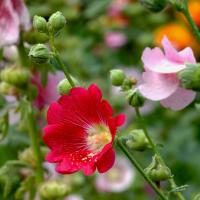How to Handle Fungus Growth in Plant Soil
Fungus growth in plant soil is a common occurrence that can affect the health and vitality of your plants, causing stunted growth, rotting roots or even plant death. Fortunately, taking the right steps to treat fungal growth can help you restore the health of your plants and avoid any potential damage. In this article, we will explore some effective ways to handle fungus growth in plant soil.
Identify the Type of Fungus
Before taking any action to treat the fungus, you must first identify the type of fungus present in the soil. Some fungi can be beneficial for plant growth while others can cause harm. Common types of harmful fungus include phytophthora, pythium, fusarium and rhizoctonia. You can identify the type of fungus by observing the color, texture and smell of the soil. Soil with foul odor and slimy texture is a sign of potential fungal infection.
Remove Infected Plants
If you notice that one or more plants are infected with fungus, remove them immediately from the rest of your plants to prevent the fungus from spreading. Make sure to discard the plants in a sealed bag and dispose of it properly. Do not add the infected plants to your compost as the fungus can survive and spread.
Treat the Soil with Antifungal Solutions
One effective way to handle fungus growth in plant soil is to treat the soil with antifungal solutions. You can use a commercial antifungal solution such as copper fungicide or neem oil to kill the fungus. Alternatively, you can create your own solution by mixing baking soda with water and spraying it on the soil. Make sure to follow the instructions on the package or recipe and apply the solution as directed.
Improve Drainage and Airflow
Fungi thrive in moist and stagnant environments, so improving the drainage and airflow in your plant soil can help prevent fungal growth. Make sure the soil has sufficient drainage holes and that water doesn't accumulate at the bottom of the pot. Using a porous potting mix, adding perlite or sand to the soil or raising the pot off the ground can also improve the drainage. Similarly, ensure that the plant has enough space and air circulation to prevent moisture buildup.
Maintain Plant Health
The best way to prevent fungal growth in plant soil is to maintain the health of your plants. This means providing the right amount of water, nutrients and light to your plants. Overwatering, over-fertilizing or placing your plants in low-light environments can weaken the plant's immune system, making it more susceptible to fungal infection. Choose the right plants for your environment, and ensure they have adequate space, light and nutrients.
Conclusion
Fungal growth in plant soil can pose a serious threat to the health and vitality of your plants, but by following the right steps, you can prevent and treat fungus growth effectively. Identify the type of fungus present, remove infected plants, treat the soil with antifungal solutions, improve drainage and airflow in the soil, and maintain the health of your plants. By taking these steps, you can keep your plants happy and healthy.

 how many times do yo...
how many times do yo... how many planted tre...
how many planted tre... how many pine trees ...
how many pine trees ... how many pecan trees...
how many pecan trees... how many plants comp...
how many plants comp... how many plants can ...
how many plants can ... how many plants and ...
how many plants and ... how many pepper plan...
how many pepper plan...































